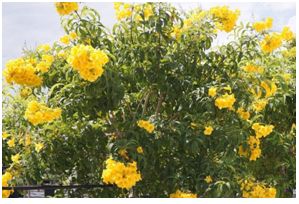
Botanical Name- Tecoma Stans (L.) Juss. ex Kunth
Common Name - Yellow Elder
Classification:-
Kingdom - Plantae
Division - Tracheophyta
Class - Magnoliopsida
Order - Lamiales
Family - Bignoneaceae
Genus - Tecoma
Species - stans
Characteristics Of Family-
Plant predominently lianous, compound leaves, zygomorphic flowers, anthers connivent in pairs; numberous ovule, silique-like woody capsule, large winged seed and non-endospermic. Mostly trees or shrubs; often climbing or twining vine, rarely herbs.
Habitat:- ecoma stans is a weed of roadsides, riparian zones (banks of watercourses), open woodlands, grasslands, forest margins, waste areas, rocky places, sandy lake shores and disturbed sites in tropical and subtropical environments.
Distribution:- Native to southern USA, Mexico, the Caribbean, Peru and Ecuador and india ( all part of kerala).
Status:- Least concern
Plant description:-
A large shrub or small, much-branched, tree usually growing 1.5 to 5 m tall, but occasionally reaching 10 m in height.
The younger stems are smooth, hairless (glabrous) and greenish in colour. They are slightly four-angled in cross-section (quadrangular) and turn pale brown or reddish-brown in colour as they age.
The bark on the main stem is light brown to pale grey in colour, furrowed, and relatively rough in texture.
The leaves (10-25 cm long) are arranged in pairs (oppositely arranged) and are borne on slender stalks (petioles) 1-9 cm long.
USES-
A leaf infusion can be taken orally for treating diabetes and stomach pains.
A strong leaf and root decoction is taken orally as a diuretic, to treat syphilis or for intestinal worms.
Trees can be planted as a live hedge.
The light brown wood is hard and very durable. It is used in cabinet making, turnery, to make tools, and in the construction of buildings.